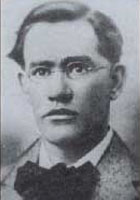Friday, November 11, 2005
In remembrance
 Today is a day to reflect on the great sacrifices made my men of amazing courage, 'lions led by donkeys', who have died in war.
Today is a day to reflect on the great sacrifices made my men of amazing courage, 'lions led by donkeys', who have died in war.In Britain today, millions of people held a two-minute silence to mark Armistice Day.
The silence, at the 11th hour of the 11th day of the 11th month, represented the moment when all guns stopped at the end of World War.
For Irish people, days like today can be awkward because events like the two World Wars were overshadowed by events closer to home. Still, I don't think that should mean we ought to forget the role played by Irish people in these major events.
The man pictured above left is Francis Ledwidge, perhaps the most renowned Irish war poet of the time. Ledwidge, born in Slane,was a founder member of the Irish volunteers and on the outbreak of war, he joined the Royal Inniskillen Fusilliers in Dublin. In 1915 he saw action at Suvla Bay in Turkey. Having survived Gallipoli, he was dismayed by the news of the Easter Rising and the execution by the British of his good friend and fellow poet Thomas MacDonagh and felt he had to get out of the British army as soon as possible. He was court-martialled and demoted for overstaying his home leave and lost his lance corporal stripe, though this hardly bothered him. On July 31st the 1st Battalion of the Royal Inniskillen Fusiliers of which Frank was a member were repairing the road to Pilkem near the village of Boezinghe northwest of Ieper (Ypres). In the afternoon of that day a shell exploded beside them, killing one officer and five enlisted men, among them Ledwidge. Chaplain Father Devas was among the first to arrive on the scene. That night he wrote in his diary:
"Ledwidge killed, blown to bits…"
Francis Ledgwidge's most notable work is the poem he wrote for his executed friend, 'Lament for Thomas MacDonagh'. However, I feel a more apt poem to highlight at this time would be the poem he wrote called 'Home' written days before he would meet his death. Ledwidge's unit was ordered north into Belgium in preparation for the third Battle of Ypres. Despite the horror of war his love for nature and his home remained unabated and one day during a lull in the bombardment he heard a robin singing which inspired this poem...
HOME
A burst of sudden wings at dawn,
Faint voices in a dreamy noon,
Evenings of mist and murmurings,
And night with rainbows of the moon.
And through these things a wood-way dim,
And waters dim, and slow sheep seen
On uphill paths that wind away
Through summer sounds and harvest green.
This is a song a robin sang
This morning on a broken tree,
It was about the little fields
That call across the world to me.
You can read more about the life of Francis Ledwidge here. On this day, let us remember all the brave men like Francis Ledwidge who fought with their lives in horrific circumstances and who showed more courage than any of us could ever dream of. God bless them.
© 2008 United Irelander.

